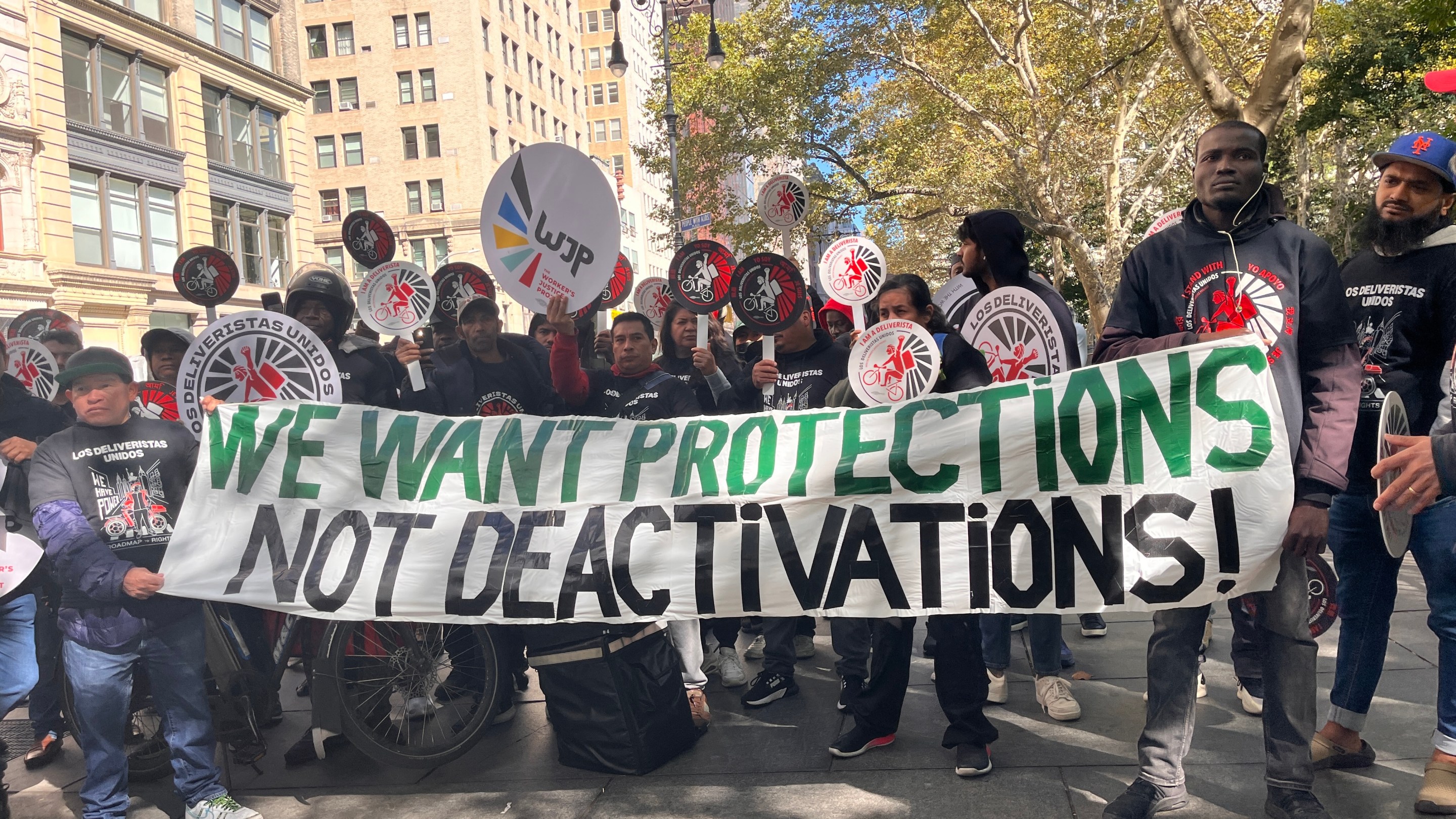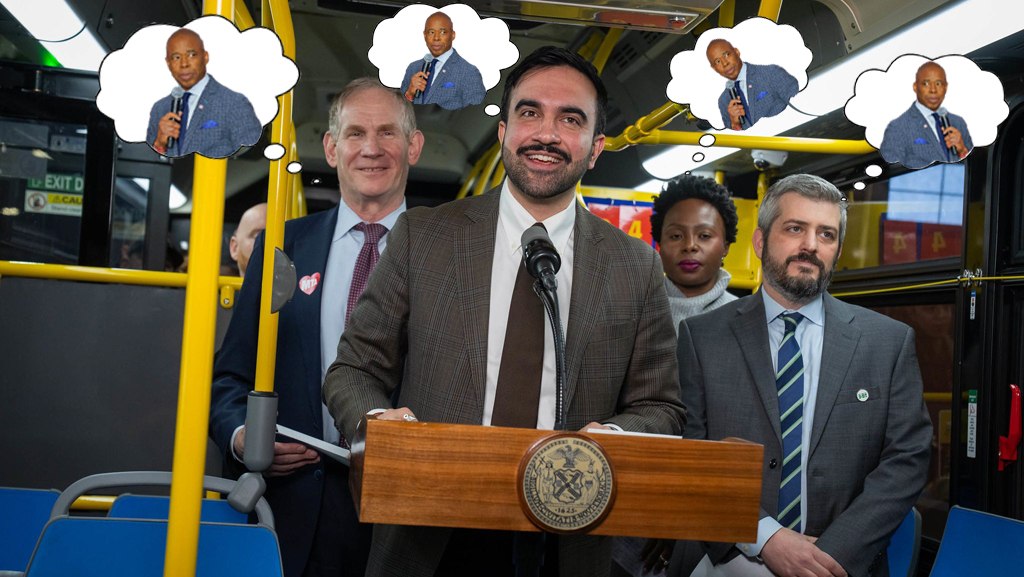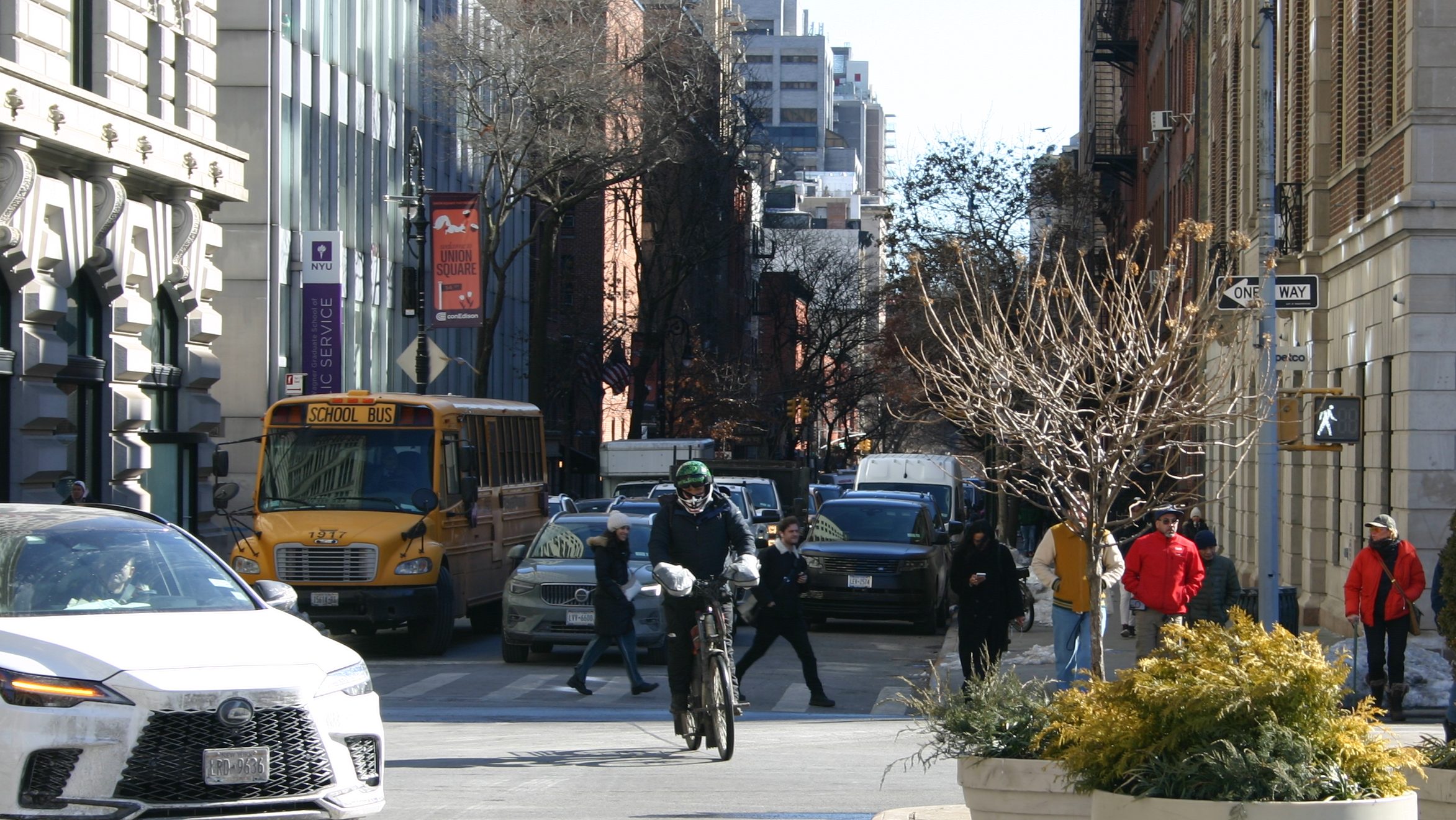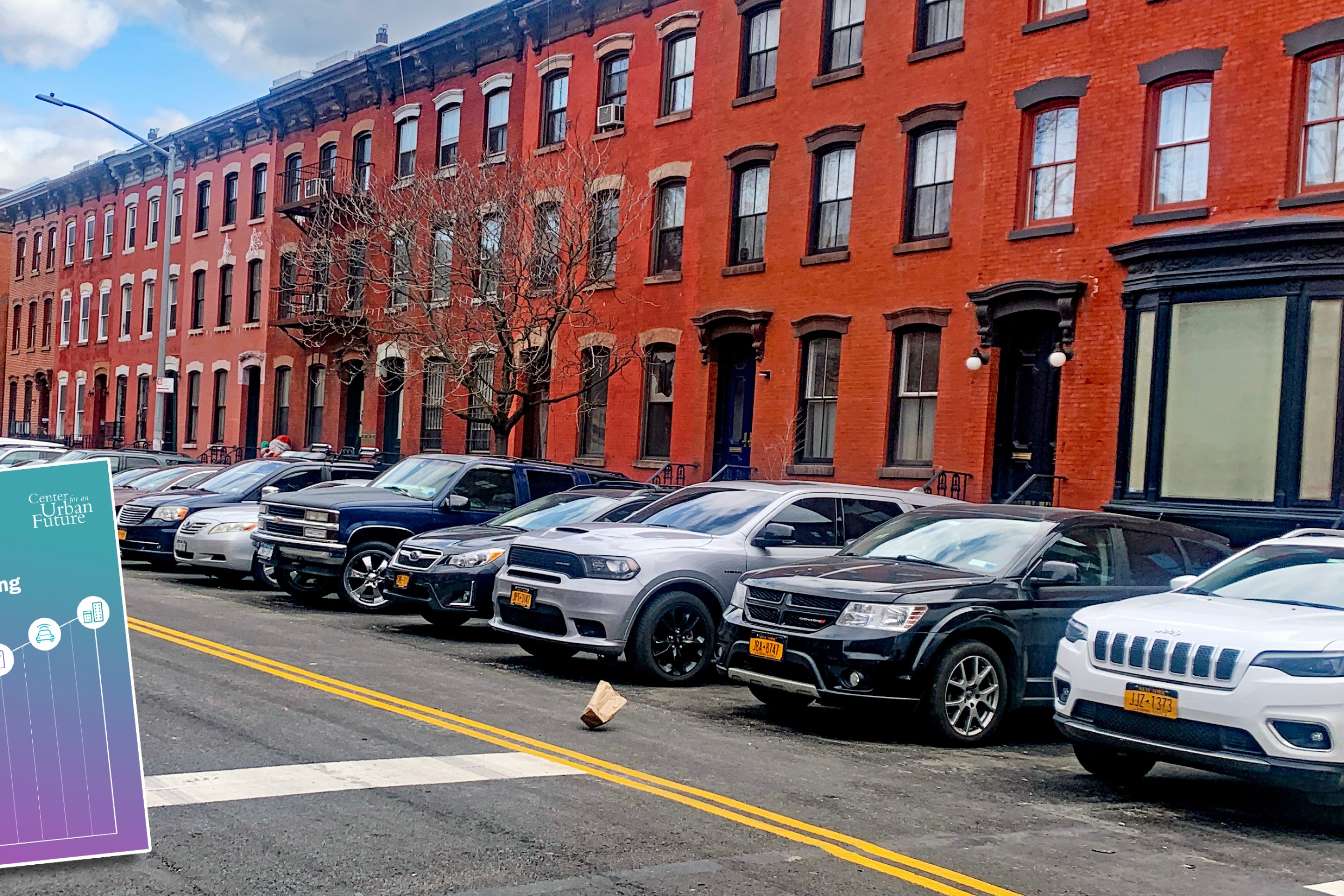You snooze, you lose.
Delivery app companies like DoorDash, UberEats, GrubHub, and Wonder are incentivizing delivery workers to ride recklessly by dangling the possibility of deactivation – essentially getting fired – without a fair review process.
At a rally last week to promote a City Council bill that could solve this problem, workers told story after story of being deactivated from the apps.
“[DoorDash] deactivated me the other day. They gave me no explanation. They did not say why,” Juan Iturbide, who had ridden for DoorDash for six years, said in Spanish. "We have to work everyday to sustain our families, our kids, the rent, and everything else."
Another worker was accused of taking food, which he denies, and UberEats could not provide him with any proof.
"They said I got a free item without paying, no explanation at all," said Jean Demusa. "They just think because we are delivery workers we are not human, they can just treat us any way. I called them so many times, I said, ‘You have to give me some explanation,’ but they refused. That’s why we are gathered here today, to stop that injustice.”
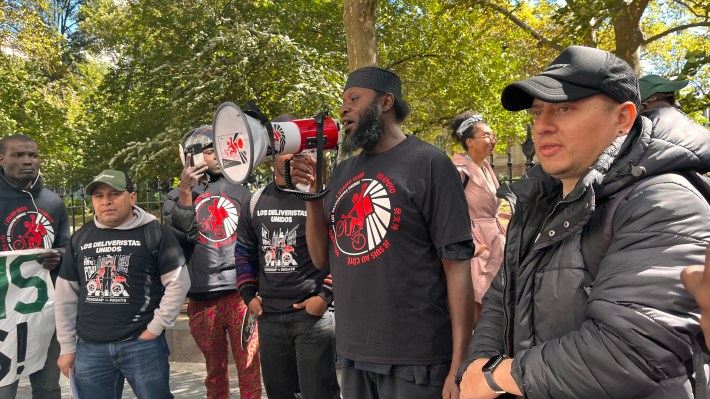
And a third worker described how he and his friends live in fear of being deactivated after working thanklessly for GrubHub for years.
"[GrubHub] deactivated my account for no reason. They say I didn’t take a clear picture. And this is really ridiculous because I work mostly in the night time," Shahadat, who goes by one name, said at the rally. "So many times, we are working and waiting for the restaurant for an hour, and they call us and say, ‘You aren’t working. Why are you waiting so long,’ but they don’t even know why we are waiting. Every week we think, ‘Maybe this week my account is going to get deactivated.’"
The delivery app industry has grown tremendously since Los Deliveristas Unidos, a part of the Worker's Justice Project, began organizing and advocating for minimum pay in 2020, when delivery workers were being hailed by city officials as "essential."
Now, there are more apps, and a more diverse workforce. The mostly Spanish-speaking deliveristas have joined with new arrivals from Africa, led by the mutual aid group Afrikana, and workers from Bangladesh, led by the group DRUM (Desis Rising Up and Moving) to continue the fight for better working conditions. A bill introduced by Council Member Justin Brannan (D-Bay Ridge) has brought these workers together to continue fighting against their app-industry bosses. At Thursday's rally for the bill, workers spoke in English, French, Spanish and Bangla.
"Every delivery worker, especially the Black and immigrant workers who are too often overlooked, deserves fairness, respect, and protection from unjust deactivations,” said Adama Bah, CEO and founder of Afrikana. "Afrikana stands with Worker’s Justice Project and Los Deliveristas Unidos because when we defend workers rights, we affirm the dignity of every person who keeps this city moving."
A pervasive problem
Los Deliveristas Unidos has filed more than 1,000 deactivation complaints with the major restaurant app delivery companies – DoorDash, Uber and Grubhub – just in the last four months, according to Ligia Guallpa, the executive director of the Worker’s Justice Project, which organizes Los Deliveristas Unidos. GrubHub has offered an appeals process for a group of 60 workers, but DoorDash and Uber have been silent.
“We can no longer rely on the good will of these companies,” said Guallpa.
Workers have been sounding the alarm on the need for deactivation protections to fully realize the safety promises of the industry minimum wage since it was enacted in 2023. Advocates see the situation as powerful companies using opaque algorithmic management, punishing workers for daring to advocate for themselves.
"We need to pass legislation to protect us against deactivations. We don’t want the future of our work to be decided by machines, by robots, by a mathematical equation," said William Medina, an organizer with Los Deliveristas Unidos and a delivery worker of over seven years, in Spanish. "The company simply uses its Silicon Valley scientists to manipulate the system and define our future."
The algorithms in question seem to prioritize workers who speed or accept many deliveries, making deactivation protections a key step in promoting the safe use of e-bikes.
“The companies think the deliverista is a machine that has to ride through the city without regard for their safety,” Guallpa said at the rally. “[The app companies] are accusing the deliveristas of taking too long to make a delivery.”
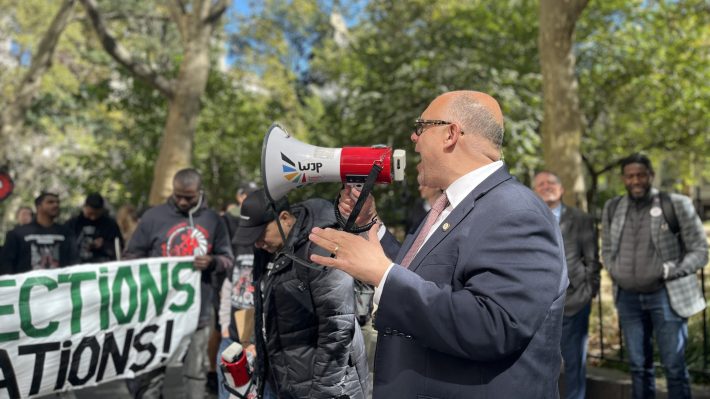
How would it work?
Under Brannan’s Intro 1332, companies would only be able to fire or lock out workers if there is a reason — and that reason has to be disclosed to workers. The companies would also have to enact some other type of disciplinary action prior to deactivation.
The bill also defines deactivation as “any indefinite or permanent discharge, termination or layoff of an app-based delivery worker or any revocation or restriction of an app-based delivery worker’s access to the delivery platform or authorization to accept deliveries on the delivery platform.”
This way, the bill covers both instances of deactivation and times where workers are locked out but are still able to work at other days or times.
The app companies, which have fought city regulations at every turn, are fighting the bill. To Wonder Group, which owns the delivery companies Seamless, Relay, and GrubHub, the bill doesn’t take into account the nature of app work and the reasons that workers may be restricted from logging on.
“Intro 1332, as currently written, does not reflect the structure of app-based work and imposes significant operational and safety risks. … Drivers log on and off at will, work independently, contract with multiple platforms, and are not assigned to fixed locations or shifts,” testified GrubHub Associate Director of Government Affairs Joshua Bocian (who formerly worked for the City Council and the Manhattan Borough President).
And DoorDash said that while it respects the intent of the proposal, it will decrease safety.
“As written, this proposal would make it harder to remove unsafe or dangerous actors from our platform and risks the well-being of local businesses and customers. Safety and fairness are crucial to us, but we cannot guarantee safety under a model like this where consumers are discouraged from speaking up and bad actors are protected,” said Kassandra Perez-Desir, Senior Manager of Government Relations for New York.
DoorDash, UberEats and Instacart did not reply to Streetsblog’s request for comment on the bill. But at a Council hearing for the bill in September, a representative from the Chamber of Progress, which is funded by Instacart and DoorDash, spoke against the bill, as did an UberEats representative.
Making minimum pay work
Although the app companies consistently blame the minimum pay law as the reason they need to lock out workers, labor economists and the Department of Consumer and Worker Protection routinely point out that the law does not require the companies to restrict access to the app.
The companies have two options for complying with minimum wage. In the "standard option," which most companies use, the app's payment to each individual worker must be at or about the minimum pay rate multiplied by the sum of that worker’s trip time (time between pickup and delivery) during the week. And the app’s total payment to all workers operating during that pay period must meet or exceed the minimum wage multiplied by the sum of all workers’ total time worked that week.
In the second option, the “alternative option,” the company pays each worker the “alternative minimum pay rate” for just the time between pickup and delivery. The alternative rate is calculated by dividing the minimum pay rate by 60 percent, which includes the time a worker is not actively making a delivery, but is still working, known as the “utilization rate.”
Brannan’s bill could stop the companies from exploiting the loophole in the “standard method,” where their bottom line is helped by periodically blocking access.
“[The standard method] is really confusing for the workers, because they don't know which basis they're being paid on,” James Parrott, the director of economic and fiscal policies at the Center for New York City Affairs at The New School, told Streetsblog when the bill was introduced. "The companies have been manipulating that; they've created a loophole, and workers are being punished as a result of that."
Editors note: After initial publication of this story, DoorDash claimed that Juan Iturbide was removed from the platform in 2021 for failing to provide a W9 and had only worked for the company for six months.
